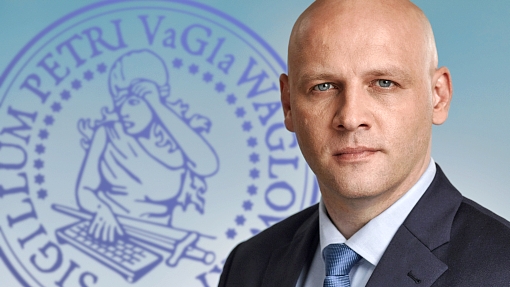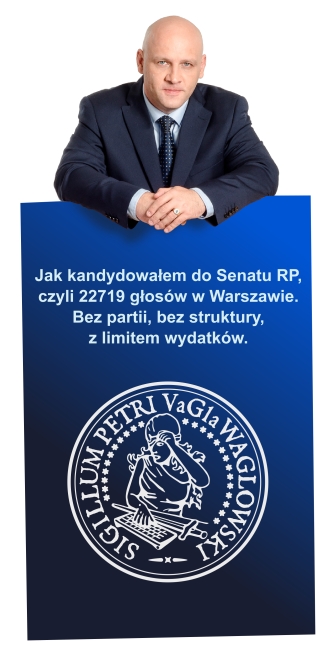Dalszy ciąg dyskusji na temat pojęcia "prasa" w erze demokratyzowania się mediów (elektronicznych)
Sławomir Wikariak publikuje dziś w Rzeczpospolitej tekst, w którym sygnalizuje wektory krytyki nowej wersji projektu nowelizacji Prawa prasowego. Co ciekawe - ujawniono tam stanowisko dyrektora generalnego Izby Wydawców Prasy, który nie jest zadowolony z tego, że elektroniczne "dzienniki lub czasopisma" będzie można - wedle projektu - rejestrować na zasadzie dowolności (bo to "prowadzi do jawnej nierówności między podmiotami..."). W trakcie niedawnej dyskusji w Centrum Prasowym na ul. Foksal w Warszawie miałem wrażenie, że środowisko wydawców przychylało się do pomysłu dobrowolnego rejestrowania. Osobiście uważam, że rejestracja "elektronicznych publikacji" w sądzie nie jest w ogóle potrzebna dla realizacji sygnalizowanego celu, tj. wskazania odpowiedzialnego za publikacje online (mamy np. rejestry domenowe). Tak czy inaczej łagodząc nieco stanowisko w kwestii "rejestracji" ministerstwo swym nowym projektem dokonuje próby ingerencji w sferę definicji pojęcia "prasa", a robiąc to - jak uważam - usiłuje (intencjonalnie lub nieintencjonalnie) ograniczyć zakres oraz instytucjonalną ochronę wolności słowa w Polsce. W tej zaś notatce przybliżam kilka dokumentów Rady Europy, które warto uwzględniać w tej dyskusji, co się zresztą dzieje.
Tekst Sławomira Wikariaka ukazał się pod tytułem Bloger nie zasłoni się tajemnicą dziennikarską. Wypowiada się tam Łukasz Lasek z Obserwatorium Wolności Mediów Helsińskiej Fundacji Praw Człowieka, Michał Zaremba z Uniwersytetu Warszawskiego, przywołany wyżej Maciej Hoffman, dyrektor generalny IWP oraz autor niniejszej notatki, czyli Piotr Waglowski (w podwójnej roli, a więc autora serwisu VaGla.pl Prawo i Internet, a także członka zarządu stowarzyszenia Internet Society Poland, które dwa dni temu przesłało do Ministerstwa Kultury i Dziedzictwa Narodowego opinię do ostatniego projektu ustawy). Przy tekście Rzeczpospolitej jest również opinia prof. Ryszarda Markiewicza.
Nie powielając już wcześniej spisanych uwag własnych (por. Propozycje nowelizacji Prawa prasowego a propozycje w zakresie inwigilacji elektronicznej komunikacji oraz Minister kultury postanowił wprowadzić do systemu prawnego blogi (a projekt opublikował, jakby nie chciał, by go komentowano)) pragnę zwrócić uwagę na to, co powiedział dr Zaremba, komentujący ostatnią wersję projektu ministerstwa:
(...)
Autor bloga nie będzie więc mógł się powołać na tajemnicę dziennikarską, by chronić informatora – mówi Michał Zaremba z Uniwersytetu Warszawskiego. – Jest to wbrew rekomendacji Rady Europy, zgodnie z którą ochrona tajemnicy dziennikarskiej przysługuje każdemu dziennikarzowi, przy czym pojęcie to rozumiane jest szeroko – obejmuje każdą osobę gromadzącą informacje w sposób profesjonalny w celu ich rozpowszechnienia, a więc również autorów blogów czy książek.
(...)
Otóż istotnie kilka dokumentów Rady Europy warto przywołać. Na początek kilka rezolucji:
- Rezolucja Zgromadzenia Parlamentarnego Rady Europy Nr 1003 (1993) (on the ethics of journalism)
- Rezolucja Zgromadzenia Parlamentarnego Rady Europy Nr 1506 (2001) (Freedom of expression and information in the media in Europe)
- Rezolucja Zgromadzenia Parlamentarnego Rady Europy Nr 1589 (2003) (Freedom of expression in the media in Europe)
- Rezolucja Zgromadzenia Parlamentarnego Rady Europy Nr 1535 (2007) (Threats to the lives and freedom of expression of journalists)
Rekomendacja, którą przywołał cytowany wyżej dr Zaremba, to Recommendation No. R (2000) 7 of the Committee of Ministers to member states on the right of journalists not to disclose their sources of information. I tu właśnie czytamy m.in. nie tylko o "profesjonalnym" rozpowszechnianiu, ale również o regularnym rozpowszechnianiu informacji:
(...)
For the purposes of this Recommendation:a. the term "journalist" means any natural or legal person who is regularly or professionally engaged in the collection and dissemination of information to the public via any means of mass communication;
b. the term "information" means any statement of fact, opinion or idea in the form of text, sound and/or picture;
c. the term "source" means any person who provides information to a journalist;
d. the term "information identifying a source" means, as far as this is likely to lead to the identification of a source:
i. the name and personal data as well as voice and image of a source,
ii. the factual circumstances of acquiring information from a source by a journalist,
iii. the unpublished content of the information provided by a source to a journalist, and
iv. personal data of journalists and their employers related to their professional work.
Principle 1 (Right of non-disclosure of journalists)
Domestic law and practice in member states should provide for explicit and clear protection of the right of journalists not to disclose information identifying a source in accordance with Article 10 of the Convention for the Protection of Human Rights and Fundamental Freedoms
(hereinafter: the Convention) and the principles established herein, which are to be considered as minimum standards for the respect of this right.
Principle 2 (Right of non-disclosure of other persons)
Other persons who, by their professional relations with journalists, acquire knowledge of information identifying a source through the collection, editorial processing or dissemination of this information, should equally be protected under the principles established herein.
Principle 3 (Limits to the right of non-disclosure)
a. The right of journalists not to disclose information identifying a source must not be subject to other restrictions than those mentioned in Article 10, paragraph 2 of the Convention. In determining whether a legitimate interest in a disclosure falling within the scope of Article 10, paragraph 2 of the Convention outweighs the public interest in not disclosing information identifying a source, competent authorities of member states shall pay particular regard to the importance of the right of non-disclosure and the pre-eminence given to it in the case-law of the European Court of Human Rights, and may only order a disclosure if, subject to paragraph b, there exists an overriding requirement in the public interest and if circumstances are of a sufficiently vital and serious nature.
b. The disclosure of information identifying a source should not be deemed necessary unless it can be convincingly established that:
i. reasonable alternative measures to the disclosure do not exist or have been exhausted by the persons or public authorities that seek the disclosure, and
ii. the legitimate interest in the disclosure clearly outweighs the public interest in the non-disclosure, bearing in mind that:
- an overriding requirement of the need for disclosure is proved,
- the circumstances are of a sufficiently vital and serious nature,
- the necessity of the disclosure is identified as responding to a pressing social need, and
- member states enjoy a certain margin of appreciation in assessing this need, but this margin goes hand in hand with the supervision by the European Court of Human Rights.
c. The above requirements should be applied at all stages of any proceedings where the right of non-disclosure might be invoked.
Principle 4 (Alternative evidence to journalists' sources)
In legal proceedings against a journalist on grounds of an alleged infringement of the honour or reputation of a person, authorities should consider, for the purpose of establishing the truth or otherwise of the allegation, all evidence which is available to them under national procedural law and may not require for that purpose the disclosure of information identifying a source by the journalist.
Principle 5 (Conditions concerning disclosures)
a. The motion or request for initiating any action by competent authorities aimed at the disclosure of information identifying a source should only be introduced by persons or public authorities that have a direct legitimate interest in the disclosure.
b. Journalists should be informed by the competent authorities of their right not to disclose information identifying a source as well as of the limits of this right before a disclosure is requested.
c. Sanctions against journalists for not disclosing information identifying a source should only be imposed by judicial authorities during court proceedings which allow for a hearing of the journalists concerned in accordance with Article 6 of the Convention.
d. Journalists should have the right to have the imposition of a sanction for not disclosing their information identifying a source reviewed by another judicial authority.
e. Where journalists respond to a request or order to disclose information identifying a source, the competent authorities should consider applying measures to limit the extent of a disclosure, for example by excluding the public from the disclosure with due respect to Article 6 of the Convention, where relevant, and by themselves respecting the confidentiality of such a disclosure.
Principle 6 (Interception of communication, surveillance and judicial search and seizure)
a. The following measures should not be applied if their purpose is to circumvent the right of journalists, under the terms of these principles, not to disclose information identifying a source:
i. interception orders or actions concerning communication or correspondence of journalists or their employers,
ii. surveillance orders or actions concerning journalists, their contacts or their employers, or
iii. search or seizure orders or actions concerning the private or business premises, belongings or correspondence of journalists or their employers or personal data related to their professional work.
b. Where information identifying a source has been properly obtained by police or judicial authorities by any of the above actions, although this might not have been the purpose of these actions, measures should be taken to prevent the subsequent use of this information as evidence before courts, unless the disclosure would be justified under Principle 3.
Principle 7 (Protection against self-incrimination)
The principles established herein shall not in any way limit national laws on the protection against self-incrimination in criminal proceedings, and journalists should, as far as such laws apply, enjoy such protection with regard to the disclosure of information identifying a source.
(...)
Są jeszcze inne dokumenty, np. Recommendation CM/Rec(2007)3 of the Committee of Ministers to member states on the remit of public service media in the information society:
(...)
Recommends that the governments of member states:i. guarantee the fundamental role of the public service media in the new digital environment, setting a clear remit for public service media, and enabling them to use new technical means to better fulfil this remit and adapt to rapid changes in the current media and technological landscape, and to changes in the viewing and listening patterns and expectations of the audience;
ii. include, where they have not already done so, provisions in their legislation/regulations specific to the remit of public service media, covering in particular the new communication services, thereby enabling public service media to make full use of their potential and especially to promote broader democratic, social and cultural participation, inter alia, with the help of new interactive technologies;
(...)
iv. enable public service media to respond fully and effectively to the challenges of the information society, respecting the public/private dual structure of the European electronic media landscape and paying attention to market and competition questions;
(...)
6. Member states should see to it that the goals and means for achievement of these goals by public service media are clearly defined, in particular regarding the use of thematic services and new communication services. This may include regular evaluation and review of such activities by the relevant bodies, so as to ensure that all groups in the audience are adequately served.
(...)
26. Member states should establish a clear legal framework for the development of public service media and the fulfilment of their remit. They should incorporate into their legislation provisions enabling public service media to exercise, as effectively as possible, their specific function in the information society and, in particular, allowing them to develop new communication services.
(...)
(...)
National laws on protection of sources need to be fully up-to-date to cover electronic content as well as print content. ENPA also believes that States should work to prevent seizure of journalistic materials (computers, mobile phones, etc), a practice which is sometimes used as a way of circumventing laws on protection of sources. The use of journalists for information should be seen as a last resort rather than an “easy target”. ENPA refers to the recent ECHR case Sanoma Uitgevers B.V. v. the Netherlands1 (31/03/2009) as a reference here: the dissenting opinions to the majority outlined how this judgment could have concerning important implications for moderation exercised by police forces in future in seizing journalistic “materials” (rather than simply “sources”).
(...)
oraz
- Login to post comments
Piotr VaGla Waglowski

Piotr VaGla Waglowski - prawnik, publicysta i webmaster, autor serwisu VaGla.pl Prawo i Internet. Ukończył Aplikację Legislacyjną prowadzoną przez Rządowe Centrum Legislacji. Radca ministra w Departamencie Oceny Ryzyka Regulacyjnego a następnie w Departamencie Doskonalenia Regulacji Gospodarczych Ministerstwa Rozwoju. Felietonista miesięcznika "IT w Administracji" (wcześniej również felietonista miesięcznika "Gazeta Bankowa" i tygodnika "Wprost"). Uczestniczył w pracach Obywatelskiego Forum Legislacji, działającego przy Fundacji im. Stefana Batorego w ramach programu Odpowiedzialne Państwo. W 1995 założył pierwszą w internecie listę dyskusyjną na temat prawa w języku polskim, Członek Założyciel Internet Society Poland, pełnił funkcję Członka Zarządu ISOC Polska i Członka Rady Polskiej Izby Informatyki i Telekomunikacji. Był również członkiem Rady ds Cyfryzacji przy Ministrze Cyfryzacji i członkiem Rady Informatyzacji przy MSWiA, członkiem Zespołu ds. otwartych danych i zasobów przy Komitecie Rady Ministrów do spraw Cyfryzacji oraz Doradcą społecznym Prezesa Urzędu Komunikacji Elektronicznej ds. funkcjonowania rynku mediów w szczególności w zakresie neutralności sieci. W latach 2009-2014 Zastępca Przewodniczącego Rady Fundacji Nowoczesna Polska, w tym czasie był również Członkiem Rady Programowej Fundacji Panoptykon. Więcej >>








komentarz prof. Markiewicza
Dziennikarze nie dają zwykle zbyt wiele miejsca na komentarz, co sprawia, że pojawiają się istotne skróty myślowe. I chyba to jest powodem, dla którego w wypowiedzi prof. Markiewicza pojawia się pewna nieścisłość.
"Gdy pojawia się propozycja objęcia publikacji internetowych prawem prasowym, a więc i obowiązkiem rejestracji..." zaczął prof. Markiewicz. O ile dobrze pamiętam wszystko zaczęło się nie od "propozycji objęcia publikacji internetowych prawem prasowym", tylko raczej od "prób rozciągnięcia obowiązku rejestracji dzienników i czasopism na publikacje internetowe". Protesty dotyczyły zatem obowiązku rejestracji, a nie objęcia prawem prasowym. Zresztą nie było moim zdaniem w ogóle propozycji objęcia publikacji internetowych prawem prasowym, bo to prawo objęło te publikacje automatycznie od samego początku ("prasą są także wszelkie istniejące i powstające w wyniku postępu technicznego środki masowego przekazywania" - art. 7 pr. pras.). A trudno protestować przeciwko propozycjom, których nie było.
Wypowiedź prof. Markiewicza sugeruje zatem następującą alternatywę rozłączną: albo objęcie prawem prasowym i rejestracja oraz przywileje, albo wyłączenie spod prawa prasowego, brak rejestracji i brak przywilejów. Moim zdaniem nie mamy, ani nie musimy mieć do czynienia z tak postawionym problemem. Rejestracja (której głównym celem jest ustalenie podmiotu odpowiedzialnego, bo przecież nie ochrona marki, którą zapewniają wystarczająco znaki towarowe, prawo do firmy, dobra osobiste itd.) nie pociąga za sobą i nie musi pociągać za sobą objęcia przywilejami takimi jak tajemnica dziennikarska i prawo przedruku.
Profesor proponuje rozwiązanie sugerowanego przez siebie dylematu poprzez umożliwienie wyboru samym zainteresowanym. Nie jestem przekonany, czy to jest właściwe rozwiązanie. Oznacza ono bowiem to, że obywatel musiałby spełnić jakieś wymagania formalne, aby skorzystać z wolności słowa/prasy (przenosząc propozycję profesora na większy poziom ogólności). Równie dobrze możemy proponować, aby obywatel mógł wybrać, czy obejmie go prawo do nietykalności osobistej, prawo do prywatności itp. Nie jestem pewien, czy wprowadzenie takiej "zbywalności" podstawowych praw i wolności to jest coś, co należy robić w demokratycznym państwie prawnym. Zawsze może przecież wtedy wykształcić się mechanizm, który spowoduje, że nagle tylko nielicznym będzie się opłacało korzystać z wolności (a propos - czy jeżeli wybiorę, że nie chcę korzystać z wolności słowa/prasy, to będę mógł płacić niższe podatki?).